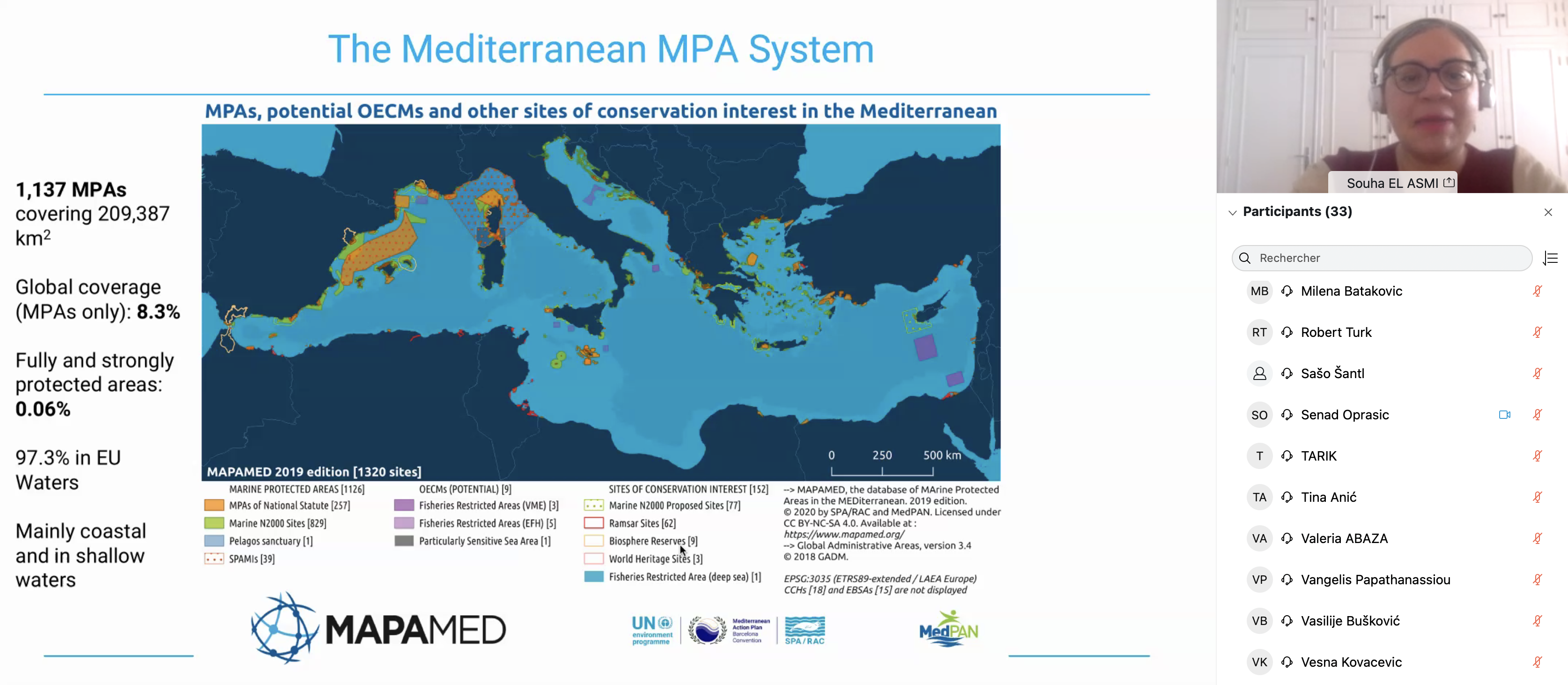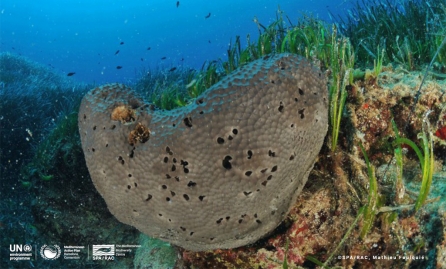Search
04/21: TAIEX EPPA sub-regional workshop on the designation of marine protected areas in Albania, Bosnia & Herzegovina, and Montenegro
UNEP/MAP-SPA/RAC participated in the TAIEX EPPA sub-regional workshop, held online on 20-21 April 2021.
The sub-regional workshop on the designation of marine protected areas is an initiative of the EC-TAIEX Environment Partnership Programme for Accession (EPPA) to present the scientific basis for evaluating potential areas for the establishment of new marine protected areas (MPAs) in Albania, Bosnia & Herzegovina and Montenegro and in the Adriatic Sea basin in general, as well as recommendations for their management.
The core of the EPPA study for designating new MPAs in the three beneficiary countries, are individual country reports and recommendations: The report for Albania proposes two new MPAs: the Porto Palermo zone and the Lalzi bay Rodoni/Cap Paton area. For Bosnia & Herzegovina a single cross border site is proposed in the Neum-Klerk bay and Mali Ston bay linking with an adjacent area in Croatia already declared as a protected site within Natura 2000. The report for Montenegro also proposes two sites Platamuni and the Katie-Ratac zone. Additionally, on a regional scale, the area located in the southern Adriatic basin and the northern Ionian Sea, considered to be an Ecologically and Biologically Significant Marine Area (EBSA), was also proposed to become a regional MPA in the south Adriatic, possibly through the declaration of a transboundary Specially Protected Areas of Mediterranean Importance (SPAMI). This includes areas within the jurisdiction of Albania, Montenegro, Bosnia & Herzegovina, Croatia and Italy.
Represented by Souha El Asmi, SPA programme officer, SPA/RAC participated in the workshop to contribute to the discussion on the EPPA Study and Recommendations for the designation of Marine Protected Areas in Albania, Bosnia and Herzegovia and Montenegro and to share updates on the elaboration process of the Post-2020 Regional Strategy for Marine Protected Areas and Other Effective area-based Conservation Measures in the Mediterranean.

An ambitious but realistic strategy for MPAs that fits a challenging context
The Mediterranean Sea is a biodiversity hotspot. The marine and coastal ecosystems are among the most important in the world in terms of species diversity, but with increasing anthropogenic pressure their resilience, as well as the services they provide to human societies, are under threat.
It is now well established that fully protected, well-designed, well-managed, and well-enforced MPAs can protect important marine resources and support the economy and culture of the region. The Mediterranean countries have been investing in marine protected areas for several decades and a significant progress has been made in recent years.
The 10% coverage of conserved areas requested by the CBD Aichi Target 11 is not far off, with 1,137 MPAs covering 8.3% of the basin. This percentage doesn’t include OECMs, given that no marine OECMs have been already declared to the CBD, in the Mediterranean region, so far.
However, this coverage hides an uneven distribution of MPAs across the Mediterranean Sea and across Parties to the Barcelona Convention. 97.3% of MPAs are located in the European Union waters, and they are mainly coastal and in shallow waters*.
Furthermore, Aichi Target 11 is not limited to reaching 10%. Having ‘’effectively and equitably managed” MPAs and OECMs by 2020 implies that numerous qualitative improvements be made, in link with: legal frameworks and governance, availability of adequate funding, systematic management planning, appointment of sufficient permanent staff, regulations and surveillance, stakeholder engagement, and integration with Marine Spatial Planning.
All these considerations are refclected in the new Post-2020 Strategy for Mediterranean MPAs and OECMs. The proposed actions aim notably to expand the protected areas network and to enhance its governance and management effectiveness. The strategy is being developed by SPA/RAC in line with the Post-2020 Global Biodiversity Framework of the CBD and other relevant global and regional processes, and through a consultative and integrated process to ensure that the actions proposed are both transformational and realistic.
How to develop a system of effectively and equitably managed MPAs and OECMs in the Mediterranean?
The first step in the elaboration of the Post-2020 Strategy for Mediterranean MPAs and OECMs was to identify the barriers, their drivers and the key actions to mitigate the obstacles, all through a wide consultation process. As a result, five strategic pillars were identified. The new strategy addresses the coverage issue, but also qualitative aspects related to management, governance, and government and stakeholder’s support and action. It also considers OECMs as a key axis to increase the coverage of sustainably managed areas in the Mediterranean.
The five strategic pillars and their respective outputs and outcomes will serve the following overall goal: “By 2030, 30% of the Mediterranean Sea is protected through a well-connected and effective system of protected areas and other effective area-based conservation measures”. This (non-definitive) goal is inspired by the post-2020 CBD target currently under negotiation.
Work on the strategy is still ongoing. The first draft has been presented and discussed during a 2-day online Stakeholder Consultation Workshop (8-9 April 2021), that was attended by 51 participants from national institutions, universities, UN and other intergovernmental organizations, NGOs and individual experts.
Two other workshops will be organized soon to finalize the draft strategy, respectively with the Ad hoc group of experts for MPAs in the Mediterranean (AGEM) on 3-4 May 2021, then with the SPA/BD Focal Points on 18 May 2021. After these preparatory consultations, the drat strategy will be formally submitted to the 15th meeting of SPA/DB Focal Points (videoconference, 23-25 June 2021), then to the MAP Focal Points meeting (Athens, Greece, 14-17 September 2021) and eventually to COP 22 (Antalya, Turkey, 7-10 December 2021).
* More information on Mediterranean MPAs will be available in the new edition of the Status of Mediterranean MPA that will be published on the occasion of the next MPA forum, an initiative of MedPAN and SPA/RAC, which third edition is co-organized by SPA/RAC, MedPAN, WWF, and the Prince Albert II of Monaco Foundation.
To know more about the workshop and get the presentations, please visit: http://eppanetwork.eu




Suivez nous sur ...